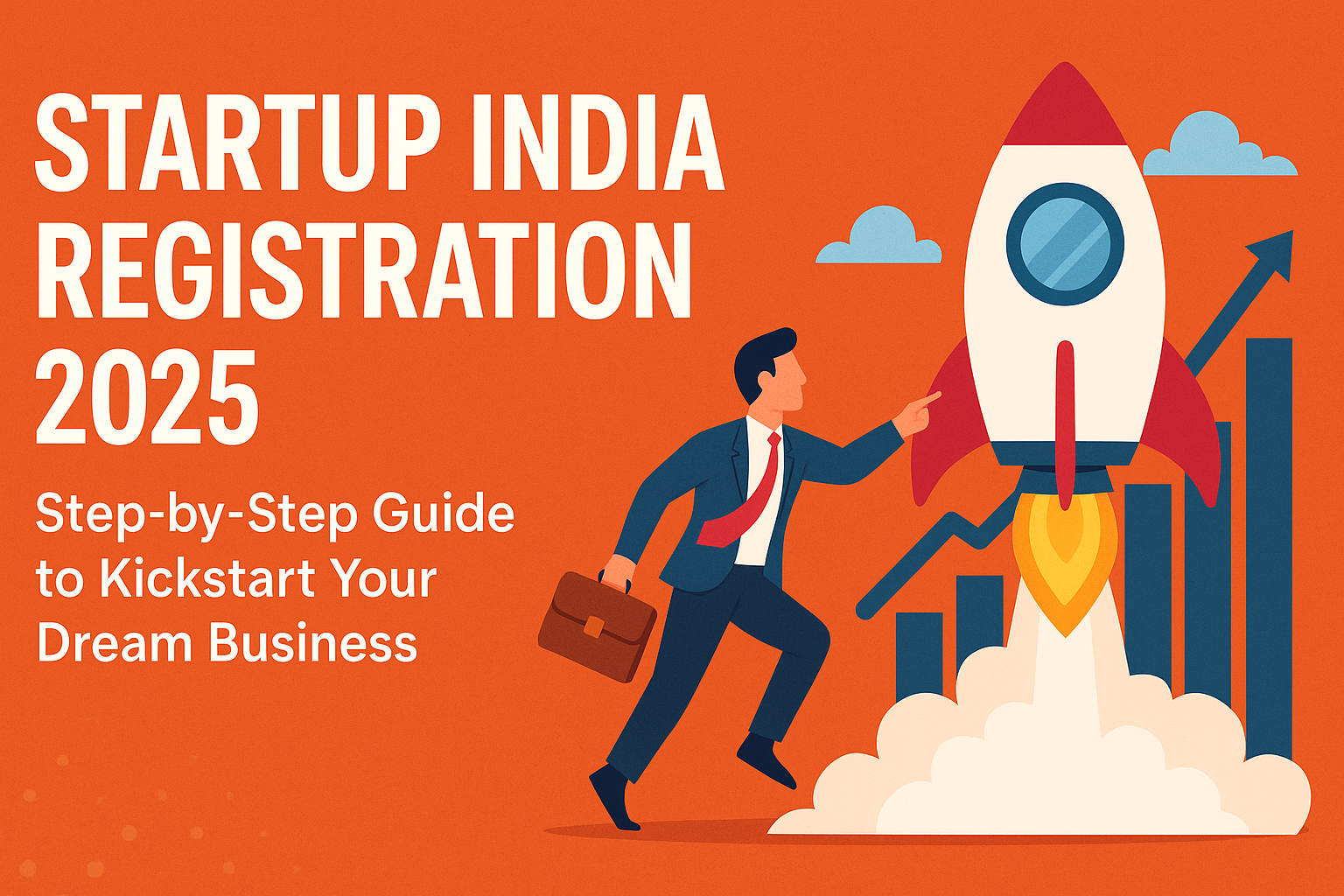Table of Contents
ToggleStep-by-Step Process to Register Your Startup in India (2025)
Thinking of launching your own startup in India? There’s never been a better time — and getting your Startup India Registration done right is where it all begins. With investor interest peaking, digital infrastructure booming, and strong government backing, 2025 is your year to go from idea to impact. This guide breaks down the registration process step by step — simple, current, and actionable.
Why Should You Register Your Startup?
Legal Identity & Protection
Registering your startup under the Startup India Registration framework gives it a recognized legal identity — like a Private Limited Company or LLP — protecting you from personal liability, tax exemptions, establishing your rights, and making it easier to do business professionally.
Access to Government Benefits
Schemes like Startup India offer fast-track patent filing, easier compliance norms, access to incubators, mentorship, and more.
👉 Explore our guide to the Best Government Schemes for Startups in India (2025) — including Startup India, MSME, Seed Fund, and more.
Easier Funding & Tax Perks
Investors prefer businesses with legal status. Plus, registered startups may qualify for tax benefits like those under Section 80 IAC of the Income Tax Act.
Builds Trust & Credibility
Customers, investors, and partners trust businesses that are officially registered. It sends a clear message: you’re serious, compliant, and here to stay.
Eligibility Criteria for Startup Registration
Before applying for recognition under the Startup India scheme, your business must meet certain eligibility criteria set by the Department for Promotion of Industry and Internal Trade (DPIIT). Here’s what you need to qualify:
1. Age of the Company
Your business must be incorporated or registered in India within the past 10 years from the date of application.
2. Type of Entity
Only the following business structures are eligible:
- Private Limited Company (Pvt. Ltd.)
- Limited Liability
- Partnership (LLP)
- Registered Partnership Firm
3. Annual Turnover Limit
The company’s annual turnover must not exceed ₹100 crores in any of the financial years since incorporation.
4. Innovative and Scalable Model
The startup must be working towards innovation, development, or improvement of products, processes, or services, or should have a scalable business model with high potential for employment or wealth creation.
5. Original Entity, Not Split or Reconstructed
The business should not be formed by splitting up or reconstructing an existing business.
Startup India Registration (2025): Pre-Checklist & Step-by-Step Process
Here’s a step-by-step guide to complete your Startup India Registration in 2025.
Step 1: Choose the Right Business Structure
- Private Limited Company – Best for startups planning to scale and raise funds.
- LLP (Limited Liability Partnership) – Ideal for service-based small businesses.
- One Person Company (OPC) – Great for solo founders.
- Partnership Firm – Simple but has unlimited liability.
Pro Tip: Pick a structure based on your goals, team size, compliance comfort, and fundraising plans.
Step 2: Apply for Digital Signature Certificate (DSC)
You’ll need a DSC to sign documents electronically. All directors/partners must have one. Get it from providers like eMudhra or Sify.
Step 3: Get a Director Identification Number (DIN)
DIN is essential for anyone who wishes to be a director. You can apply for it through the MCA portal when filing your incorporation forms.
Step 4: Reserve Your Company Name
Use the RUN (Reserve Unique Name) service or SPICe+ Part A form to reserve your startup’s name. Ensure the name is unique and not trademarked.
Step 5: Prepare Incorporation Documents
You’ll need:
- Memorandum of Association (MOA) – States your company’s goals.
- Articles of Association (AOA) – Rules on company operations.
- Director affidavits & identity/address proofs
Step 6: File SPICe+ Form (Part A & B)
Submit this integrated form online via the MCA portal. Attach:
- MOA
- AOA
- Identity proofs
- Address proofs
- Registration fee
Step 7: Apply for PAN and TAN
Once approved, your Certificate of Incorporation will include your company’s PAN and TAN — necessary for tax-related activities.
Step 8: Register for GST (if applicable)
Mandatory if:
- Revenue exceeds ₹40 lakh (or ₹20 lakh for services)
- Selling across states or online platforms
- Register at gst.gov.ina
Step 9: Register under the Startup India Scheme
This is optional but highly recommended. Go to startupindia.gov.in to register and enjoy benefits like:
- Tax exemptions
- Easier funding
- IPR support
- Government tender eligibility
Compliance After Startup India Recognition
After your Startup India Registration is complete, staying compliant with ROC filings and tax norms is essential.
To stay compliant and operational:
- Open a business bank account
- Maintain books of accounts & file taxes
- Submit annual returns to the ROC
- Get industry-specific licenses (like FSSAI, Shops & Establishments)
Cost & Timeline Estimate
Estimated Costs:
Expense Type | Estimated Cost (₹) |
Government Filing Fees | 1,500 – 5,000 |
Professional/Legal Fees | 5,000 – 15,000 |
DSC | 1,000 – 2,000 per director |
DIN | 500 per applicant |
Name Reservation | 1,000 |
Stamp Duty (varies by state) | 500 – 5,000 |
Miscellaneous | 500 – 2,000 |
Total Estimated | ₹10,000 – ₹30,000+ |
Typical Registration Timeline:
- DSC – 1–2 working days
- DIN – 1 day
- Name Approval – 2–4 working days
- Company Incorporation – 2–3 working days
- Certificate of Incorporation + PAN/TAN – 5–7 days
- GST Registration, Bank Setup – 3–5 working days
Total Time: Around 10–15 working days
Common Mistakes to Avoid
One major mistake is rushing through the Startup India Registration process without the right documentation or legal guidance. To help you avoid setbacks, here are some common mistakes entrepreneurs make when registering their business.
1. Picking the Wrong Business Structure
It affects compliance, taxation, and investment opportunities.
2. Skipping Post-Registration Compliance
Missing GST or ROC filings can lead to hefty penalties.
3. Avoiding Legal Help
Legal guidance on IP, contracts, and regulatory needs can prevent future headaches.
Conclusion
Completing your Startup India Registration is a smart move to gain credibility, access funding, and grow faster in India’s booming startup ecosystem. With the right structure, documentation, and government support, you set the foundation for future success. Follow this step-by-step guide to simplify your journey and take your idea from concept to a fully recognized business in 2025.
Ready to launch? Don’t wait — the sooner you register, the faster you can grow, raise funds, and gain credibility in India’s booming startup landscape.









Can you be more specific about the content of your article? After reading it, I still have some doubts. Hope you can help me.
Thanks for sharing. I read many of your blog posts, cool, your blog is very good.
Thanks for sharing. I read many of your blog posts, cool, your blog is very good. https://www.binance.com/en-ZA/register?ref=B4EPR6J0
Your article helped me a lot, is there any more related content? Thanks!
Thanks for sharing. I read many of your blog posts, cool, your blog is very good.